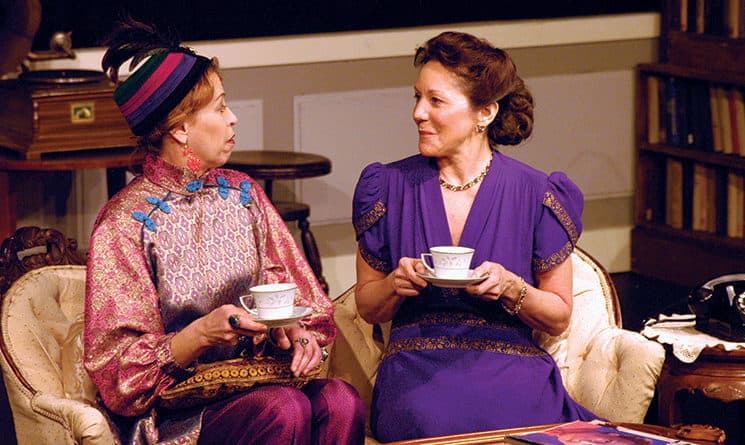The Intelligent Theatre Festival returns to Portsmouth
When Clare Boothe Luce’s play, “The Women,” made its debut on Broadway in 1936, the press wasn’t kind. The comedy featured an all-female cast, a rarity at the time, and portrayed its characters as innocent, ambitious, deceitful, selfish, flirtatious, wise, foolish, and so on. In other words, the women in “The Women” were human, not just a group of idealized wives and mothers and innocent waifs.
According to the initial reviews, though, Luce’s characters were “parasites,” “sluts,” “wretched souls,” and “odious harpies,” says Genevieve Aichele, artistic director of the New Hampshire Theatre Project (NHTP).
“The Women” is one of four plays NHTP will present as part of its annual Intelligent Theatre Festival, taking place March 18-20 at the West End Studio Theatre in Portsmouth. A fourth play will be presented at the University of New Hampshire in Durham on March 23.
The festival blends live readings of well-known — and not-so-well-known — plays with community discussions.
It’s a chance, Aichele says, to “engage in a collaborative conversation about playwriting and theater.”
“A play reading is an opportunity to hear a play in its purest form. There’s nothing between the audience and the playwright’s intentions. When you go see a finished production, it’s been interpreted by directors, by actors, by lighting and set designers,” she says.
For its 2015-2016 season, NHTP has focused its attention on producing and presenting plays by and about women, and Aichele says the festival carries on that theme. Along with “The Women,” the festival also includes a reading of “Charm” by Kathleen Cahill and “The (Female) Odd Couple,” Neil Simon’s gender-swapped version of his own play. The festival also includes an off-site collaborative production of “Body & Sold,” Deborah Fortson’s play about human trafficking, with the UNH Social Work department.
One of Aichele’s goals for the festival, and for NHTP’s current season in particular, is to shine a light on women-centered plays, particularly plays about real or fictional women who’ve been edged out of history’s spotlight. Take “Charm,” a magical realist play about Margaret Fuller, a member of the Transcendentalist movement. She was a contemporary of Emerson, Thoreau, and the other New England Transcendentalists. But an ill-fated romance with Nathaniel Hawthorne pushed Fuller into obscurity.
“It put in a stark light for me how history is controlled by those who write it,” Aichele says. “I was shocked. I first started studying the Transcendentalists in high school. We read Thoreau, Emerson, and Hawthorne, and there was Louisa May Alcott … but we never even thought about whether there were other women writers involved in that movement.”
Why an annual play reading festival? There’s an abundance of reasons, Aichele says. Along with spotlighting lesser-known plays, it’s a chance to present works that NHTP might not otherwise be able to produce. In “Charm,” one of the central motifs is a dress that keeps growing, a special effect that wouldn’t work well in a small theater, Aichele says.
The festival also brings new actors in to NHTP. Each reading features a cast made of professional and amateur actors. There’s only one rehearsal for each play, which makes the time commitment for first-time actors manageable.
“It’s a really great way for people to come together at whatever level they’re at and really experience the work. We’ve had a number of people who’ve done the readings and then decided to take acting classes or improv classes,” Aichele says.
Most of all, the festival gives the cast, audience, and sometimes, the playwright, a chance to discuss the plays and any issues they tackle. During last year’s festival, Aichele says, a discussion of one play prompted the playwright to rewrite part of the play.
Aichele’s particularly curious how audiences will respond to “The Women.” Even now, when attitudes about gender are at least a little better than they were in 1936, audiences are often divided about the characters, according to Aichele.
“I find it fascinating … some people say, “These women are so bitchy!” and others say, ‘I love these characters, they’re fascinating,” Aichele says.
The discussion after “Body & Sold” on March 23 will include a panel of experts on human trafficking. The play is based on real stories of men and women who’ve been trafficked, and Aichele says that reading and learning about the play has opened her eyes to how big the problem is.
“It’s a huge issue in New Hampshire,” she says. “When you start exploring a play, you find out all these other things connected to it that you had no knowledge of.”
The Intelligent Theatre Festival is on stage at the New Hampshire Theatre Project, 959 Islington St., Portsmouth, March 18-20, with shows on Friday and Saturday at 7 p.m. and Sunday at 2 p.m. Tickets are $10, available at nhtheatreproject.org or 603-431-6644 x5.

